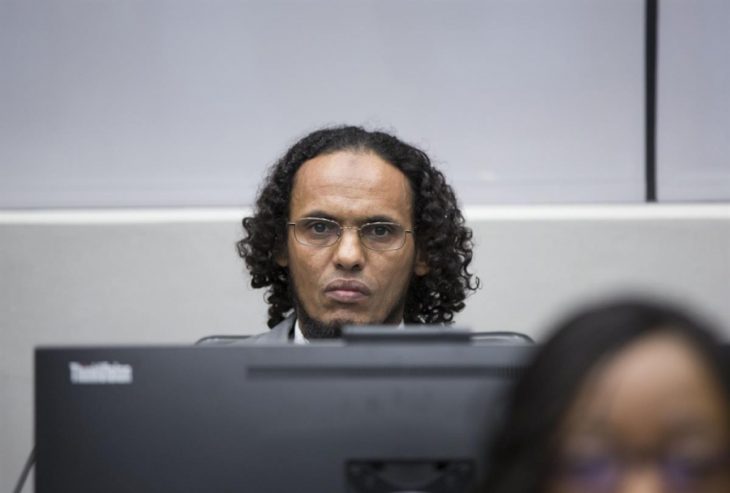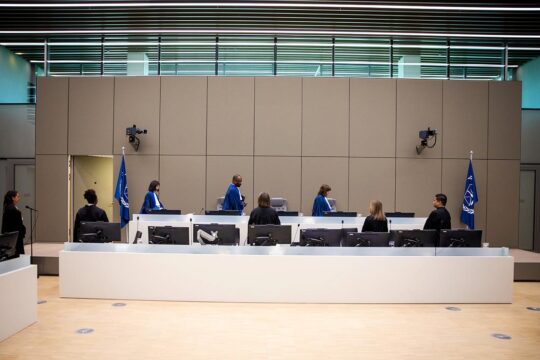The International Criminal Court (ICC) on September 27 sentenced Malian Jihadist Ahmed Al Faqi Al Mahdi to nine years in jail after he pleaded guilty to destruction of historic monuments in Timbuktu as a war crime.
The ICC Prosecutor had requested a prison sentence of between 9 and 11 years, but the judges chose the lower option. “Even if inherently grave, crimes against property are generally of less gravity than crimes against persons,” said presiding judge Raul Pangalangan. Based on expert testimonies, Timbuktu is a symbolic place that plays a special role in Islam for the region, the Filipino judge nevertheless reminded people. He said the destruction of the mausoleums was an act of war intended to destroy the soul of the people.
The soul of Timbuktu
Ahmed Al Mahdi certainly tried to win the hearts and souls of Timbuktu’s people during his trial, by asking forgiveness from the population. The judges took his repentance into consideration as a mitigating circumstance, saying it could “further peace and reconciliation in Northern Mali by alleviating the victims’ moral suffering through acknowledgement of the significance of the destruction”.
In their judgment, the judges retained the version of events recounted by the Accused. Al Mahdi, known as Abou Tourab, explained at his trial at the end of August that he never ordered the destruction of the mausoleums. For a month he observed the rites of the citizens around them. This “Koranic expert” considered that the mausoleums were illegal, but that nothing in the Koran ordered their destruction. He said he explained this to the governor of Timbuktu and head of AQMI (Al-Qaeda in the Islamic Maghreb), Abou Zeid. But the head of Ansar Dine, Iyad Ag Ghali, ordered them to be destroyed and Ahmed Al Mahdi, who was at that time head of the Islamic morality brigade of occupied Timbuktu, carried out his orders. He supervised the operation, selected the men to carry it out and the sites to be destroyed, and supplied the tools. He also wrote the Friday sermon to justify the attacks, and tried to defend them to the press.
Risks taken by the Accused
His guilty plea, his plea for forgiveness at a time when cultural heritage is being destroyed in Syria and Iraq, his call for people not to follow in his footsteps and his cooperation with the ICC Prosecutor have all worked in his favour. The judges also said that he had put himself under possible threat by pleading guilty and cooperating, as well as his family whom he has not seen since he was transferred to The Hague on September 26, 2015. Al-Mahdi was arrested in Niger by French forces of Operation Barkhane in a convoy of trucks bringing arms from Libya and agreed from the outset to answer the questions of the ICC Prosecutor. During the trial, the prosecution said that his cooperation could help future cases. The investigation, opened by the Prosecutor in January 2013 at the request of the Malian government, is continuing.
A response to extremism
Eight of the nine monuments destroyed under the orders of this Malian Touareg were listed as UNESCO cultural heritage, including the secret gate to the Sidi Yahia mosque whose opening, according to legend, spells the end of the world. At the time, UNESCO asked the ICC to conduct an investigation. UNESCO’s Bulgarian Director-General Irina Bokova hailed the verdict, in a context marked by the destruction of Mosul and Palmyra and 15 years after the dynamiting of the Buddhas of Bamiya. She said the verdict was part of a wider response needed to extremism, where culture and cultural heritage have become prime targets. The response of NGOs is more mitigated, as for the International Federation for Human Rights (FIDH), which has filed complaints in Bamako against several Jihadists including Ahmed Al Mahdi. “We would have liked that the charges against Al-Mahdi be extended to crimes against the people,” said FIDH vice-president Drissa Traore.
The judges apparently deemed that Al-Mahdi’s statements were “authentic”, but we still do not know if the repentance of this Islamic scholar also includes the aims and methods of Ansar Dine and AQMI, groups he described during the trial as having strayed from the path. Neither the prosecution nor the defence are expected to appeal the judgment, as promised in their plea bargain agreement so long as the judges limited the sentence to 9-11 years in jail. Now the judgment has been pronounced reparations hearings can start. Ahmed Al Mahdi has proposed to the Imam of the Sidi Yahia mosque to reimburse him for the cost of destruction of the gate. But history has yet to tell the spiritual price for what was stolen.





